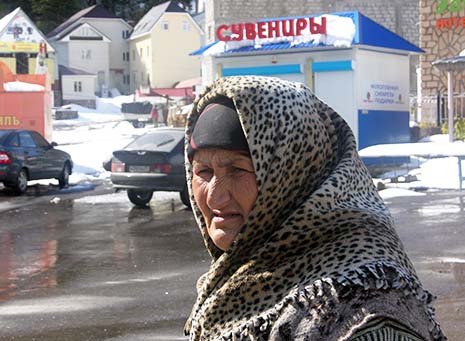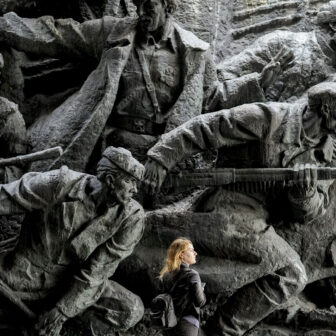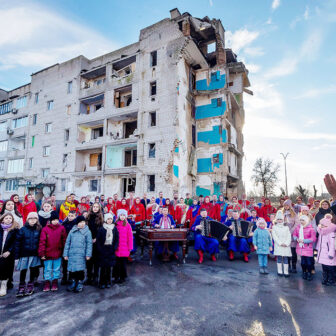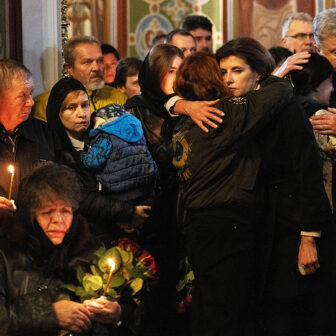Monday, 17 August 2009. The first day in my new job with a humanitarian agency. I am eager to meet new colleagues and introduce myself. I have even prepared a little speech. I worry about mundane things. Will my team welcome me? What is my office like? Will I have a computer straight away? Looking through the window of the car that delivers me to my office, I get some first impressions of Nazran, the largest city in the Republic of Ingushetia. Very scenic, a few people on the street, poor roads… Then there is a very loud noise. “Something happened,” my driver says. “We were lucky.” A terrorist has driven a vehicle loaded with 400 kilograms of TNT into the courtyard of police headquarters, only a few hundred metres ahead of us. Twenty people have been killed, 150 injured. We stop and look at the devastation. Lucky?
Humanitarian workers are trained in “rapid assessment,” a phrase that suggests an orderly and objective response to a crisis. But the scene confronted me professionally and personally. What is the scale of the disaster? Do we have a mandate to help? Would the local authorities welcome our involvement? What resources do we have and what is the best kind of intervention? Should I call my mum to tell her that I’m okay? In this case, rapid assessment meant walking around, observing, dealing with the panic, and trying to talk with people who might have answers but don’t speak the same language as I do.
We were not permitted access to the site of the incident, so we went to our office, met our medical team and planned our next steps. We decided to focus on the local hospital, which was overwhelmed by the scale of the disaster and needed help. By the end of the day we had organised the delivery of medical supplies from our warehouse, diverted from another, now less urgent project. I came as a humanitarian worker to help: that was now the only relevant issue. There was no time for my speech.
It was two weeks before I went to my first proper staff meeting. By then I had realised that I didn’t need a speech – that a clear mind and an open and brave heart were the essential requirements for a humanitarian aid worker.
I spent more than a year in the North Caucasus, among people from Chechnya, Ingushetia, Dagestan and Ossetia. I didn’t meet jihad warriors but I did meet people of faith who were praying for a better tomorrow and a peaceful today. Living among them and working with them was anything but easy. I frequently asked myself what I was doing there. But I stayed.
THE Russian Federation has eight federal districts. Seven of them were created in 2000 by Vladimir Putin to strengthen the central government’s authority. The eighth, the North Caucasus Federal District, is the youngest of them; it consists of seven republics – Karachaevo-Cherkessk, Stavropolski Krai, Kabardino-Balkaria, North Ossetia-Alania, Ingushetia, Chechnya and Dagestan – and stretches from the Black Sea to the Caspian. It was formed on 19 January 2010.
The seven republics in the North Caucasus have experienced varying degrees of instability over the past two decades, the most severe incidents being the two wars in Chechnya. The first war, between 1994 and 1996, was a conflict between the Russian Federation and the Chechen Republic of Ichkeria over the latter’s independence. The second, from 1996 to 2006, was fuelled by the Russian Federation’s response to the Chechen-based separatist movement in Dagestan, which spread to other republics in the North Caucasus. These conflicts have officially ended, but explosions, mined roads, kidnappings and random attacks on security forces continue.
The UN Department of Safety and Security reported over 400 violent terrorist or anti-terrorist incidents in 2009–10, including many in which civilians were killed. In February 2010, for example, fourteen militants and four civilians were killed on the Chechnya–Ingushetia border. In September 2010, an explosion at the central town market in the capital of North Ossetia, Vladikavkaz, killed sixteen and injured over one hundred people. During 2009 alone, at least seven people (one of them a child) were victims of mines; two of the victims died.
This region is very poor. The UN Development Programme’s latest Human Development Index, which ranks countries according to indicators such as life expectancy, income and mean years of schooling, has the Russian Federation in sixty-fifth place, well behind Australia (second) and the United States (fourth). But the index is significantly lower in all republics of the North Caucasus Federal District: according to the United Nations report published in 2010, Chechnya was ranked seventy-first and Ingushetia seventy-fifth out of the eighty Russian republics. In 2009, the average salary in Russia was 17,226 rubles (slightly less than US$600); in Ingushetia it was only 9400 rubles. More than 55 per cent of the economically active population in the region is unemployed, compared with a national average of 6.4 per cent.
Material poverty leads to poor health and is combined with low education standards throughout southern Russia. The situation is worse for Chechens who have sought refuge in other republics, where their access to health and education services is restricted. Education is offered only in Russian, and many Chechen children start school with little or no knowledge of the Russian language.
Humanitarian organisations have been trying to improve the conditions for people in the North Caucasus. The original mandate for their presence in the region was the humanitarian crisis precipitated by the wars in Chechnya. After the second conflict was over, many of these organisations left, but eight of them (based either in the United States or in the European Union) have continued to provide food and non-food aid, as well as shelter and educational opportunities for vulnerable people.
My ride in Nazran in the summer of 2009 was my first glimpse of the Russia I had come to work in as part of a team of humanitarian workers. My responsibility was to measure the aid program’s success and to develop cost-effective interventions. The organisation was aiming to shift its emphasis gradually from humanitarian help towards forms of sustainable development. During the time I spent there, we provided income-generating opportunities, preschool educational support, and health assistance to local communities. A medical centre in Ingushetia opened its doors to more than 3000 internally displaced people from Chechnya and North Ossetia living in Ingushetia. In 2009–10, preschool preparatory classes began in six schools in Ingushetia and two schools in Chechnya; some 370 children, the large majority of them internally displaced people, received vital skills to start school. Through a community centre in North Ossetia, we offered drama sessions, sport and music events and daily play sessions for children; over 200 children attended different activities each year.
To maximise sustainability and “leave a trace,” we trained people – school teachers, nurses, psychologists and mothers – in the fields that were most relevant for their private and professional development, including child protection, management of addiction, and other health-related skills. In cooperation with the local administration we created jobs through infrastructure projects, offered educational opportunities (driving lessons, an accounting class, computer lessons and a sewing course), rehabilitated local schools and repaired roads. We provided grants of up to US$8000 for people to start their own businesses.
I WAS trying to help, but there were moments when I felt totally helpless myself. Subway bombings… plane bombings… train bombings… special operations. On my daily journey between home and office I crossed four checkpoints guarded by armed soldiers. Sometimes they would thoroughly search us, at other times they would just check our documents. Every time it was stressful, not only because we were often insulted but also because we knew the checkpoints were terrorist targets. Every minute we stayed there increased the possibility of becoming victims of an attack. Every day I was happy just to reach my destination alive. Every day I counted the checkpoints: first, second, third, fourth – we are in the office! And then on the way back: first, second, third, fourth – I survived the day! Travelling in the North Caucasus is definitely about the destination not the journey. This was the first time in my life when I felt that a successful day is one where you make it to the end. Every time I talked to my parents and friends back home I made sure they knew I loved them, in case something happened to me.
I found the restrictions on my movements very difficult. Once I was in my office, I was prohibited from leaving. It is bizarre to spend days and months in a city but know nothing about it. Were there cafes and shops? Going somewhere involved advance notice and an armed escort, whatever I wanted to do. The noise of gunfire and shouting, sometimes lasting all day long and sometimes at very close quarters, was very disturbing. All the information I could get was that the noise was associated with “special operations.” I hoped that my organisation would not be the target of a “special operation.”
I had a breathtaking view of mountains from my office. I wished I could go there, but the mountains were also on the “not to do” list in the North Caucasus. A trip there required the special permission of local authorities, which many of us never received.
I soon became aware that the local people had lived this way for a long time – some of them since the day they were born. The most common reason for absences from work was attendance at the funerals of cousins or neighbours who had died in explosions as innocent, collateral victims of the conflict. In a place that creates tragic news you don’t learn about those tragedies from the news bulletins. You hear tragedy itself. You see it. You touch it. You feel it with all your senses. This feeling changed my life and my feelings.
In the end, the help the local people gave me was more significant than the help I gave them. They taught me how to live in a hostile environment, and even to enjoy it. They showed me how to live in the moment, because I might not get another chance. I learned to appreciate every sunrise and sunset but also to live with my own fears. I also learned to be thankful for every meal and every chat, every cup of tea and every smile. Life in the North Caucasus made me understand all that I had taken for granted: a country, a language, an education in my native language, freedom of movement.
Living in the North Caucasus also helped me to understand better who I am. I came there as a humanitarian worker, a sociologist with some political ambitions who wanted to help local people to live a better life. But my profession, name and vocation were seemingly of little relevance. I was a single, Slavic, Christian woman in a predominantly Muslim, anti-Slavic and family-oriented patriarchal society. I quickly learned that how others see us is as important as how we see ourselves.
I had to learn to live with others’ perceptions. In this part of the Russian Federation there is a high rate of early marriages and bride kidnappings, and routine stigmatisation of unmarried women, single mothers and women without children. It was bizarre to be afraid that I could be kidnapped, not for money but to be a wife. But it was even weirder to learn that almost all my local friends thought I would be lucky if I were kidnapped. For them I was very unfortunate to be single at my age.
To understand gender equality in the North Caucasus it is not sufficient to know how many seats women hold in the local parliament. In Chechnya a woman can’t even decide what kind of wedding dress she wears and cannot travel without the permission of her father or brothers. Women are not allowed to date men. In fact, they are not even allowed to shake a man’s hand.
Having been brought up in Serbia, I consider it normal to shake a man’s hand. But I didn’t in the North Caucasus. In the lingo of humanitarian aid workers, I was “showing respect toward the local community.” But really there was just no alternative. I simply knew I should not shake a man’s hand in the same way I know not to swim in a sea full of sharks.
IN LIFE, you can usually choose our own battles. In humanitarian work, you can’t. They are defined by the mandate of your organisation. This may have been the most difficult part of my work. You see human rights violations but you are not allowed to talk about them, because the consequences for you or your organisation could be severe – the organisation’s registration could be cancelled, say, or its staff put in personal danger.
Both beneficiaries and providers of aid face this irony of humanitarian work: you can help but only as much as a donor or the local community and authorities let you. But humanitarian work is not only about helping others. It is also about compromises, both personal and organisational. The moment you step in, you are a part of the community; like the rest of the community, you must operate within limitations. You have more money but you have less right to react to an injustice.
In Ingushetia I could not be a human rights activist, or a woman who feels her rights are violated. I was a humanitarian worker by position and a woman by social status – take it or leave it. Now in Australia, I can make other choices. I hope that a time will come when the choices will be different for the people of the North Caucasus too – that the natural resources, history and culture of the region will no longer impede development but rather will provide an efficient, developed economy. •




